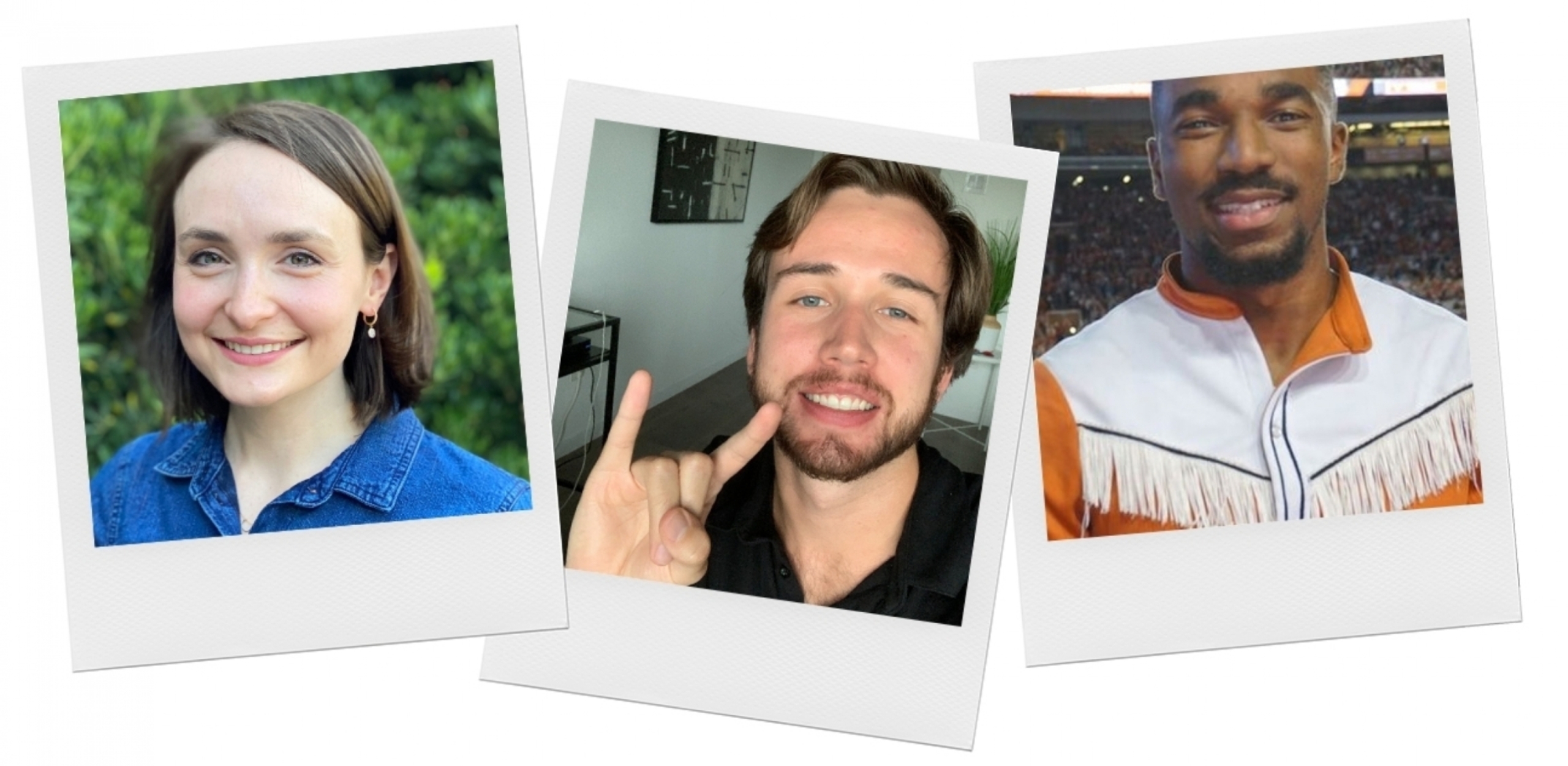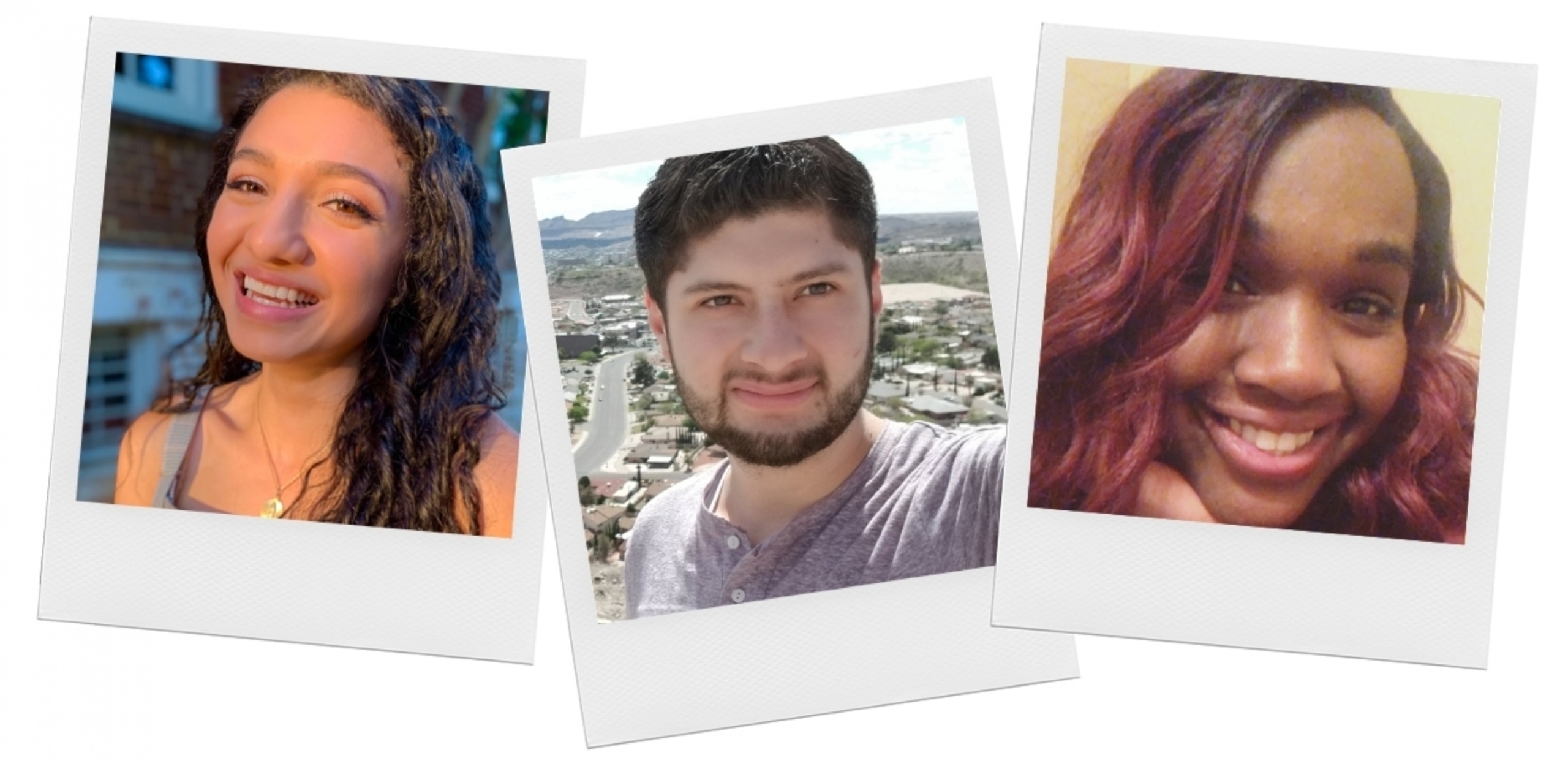For the fifth time, Dell Medical School is welcoming new future physician leaders.
It’s the first time, of course, that it has done so during a global pandemic.
The 50 students in the Class of 2024 are already demonstrating the flexibility and resiliency that will equip them to take on systemic challenges in health as they adapt to rapidly evolving learning environments in what, for many of them, is a new city. The class includes first-generation college students, researchers and scribes, in addition to those from some unexpected fields, such as architecture. Chosen from 5,148 applicants, members range in age from 21 to 31. Sixty-four percent are women, and 1 in 5 identify with a race or ethnicity underrepresented in medicine. For many, scholarship support from generous donors made their journey to Dell Med possible.
Meet six of these students now.

An Expert in the Art of Design
Name: Georgia Williams
Hometown: Houston, Texas
Education: Barnard College: B.A., Art History | Harvard University Graduate School of Design: M.Arch., Architecture
Practicing architecture at a firm in Houston led Georgia Williams to the realization that what she loved doing most was not just studying design but studying the people who would occupy her designs. After shadowing and scribing in health care, she learned that taking care of patients was what she was meant to be doing all along.
Why Dell Medical School?
I wanted an education from a school that would embrace my nontraditional background, not just accommodate it. Dell Med’s Design Institute for Health drew me in. Many of the systemic challenges in health care can be addressed through design. During my Growth Year, I hope to explore how the design of the physical environment can facilitate a more person-centered relationship between patient and provider.
Dell Medical School aspires to make Austin a model healthy city. In the interest of that, what’s one thing you think needs to be tackled?
The COVID-19 pandemic and its disproportionate blight on people of color have highlighted a fact we already know: People of color have statistically worse health care outcomes than their white counterparts. The problem is rooted in shameful history that cannot be undone, but the result of it needs to be addressed by providers today.
One of the reasons I was drawn to Dell Med is the leadership’s desire to transform health. Prevention and treatment can only happen by understanding the patient’s whole health ecosystem. We need to ask, “What are the health drivers outside of this chart that could be impacting this individual?” Only then can we understand them not as just a patient, but as a person.
Breaking Down Walls in Health Care
Name: Scott Spivey Provencio
Hometown: El Paso, Texas
Education: The University of Texas at Austin: B.A., Plan II Liberal Arts Honors & BSA, Neuroscience | University of Cambridge (England): M.Phil., Health, Medicine & Society
Growing up in El Paso, Texas, Scott Spivey Provencio always knew he wanted to be a physician. Through watching his family’s own experiences with health care along the United States-Mexico border, he felt connected to Dell Med’s mission to revolutionize how people get and stay healthy in hopes of addressing the social factors that contribute to overall health.
You’re admitted to medical school. Tell us how you got here. What were the key steps in your journey that made you who you are today?
Early on, I was exposed to my grandma’s Type 2 diabetes management. Since she emigrated from Mexico later in life, her situation was a lot more complex. I would help translate for her doctors in the U.S. that couldn’t speak Spanish and, afterward, cross the border into Ciudad Juárez to purchase cheaper medication.
It wasn’t until later that I became aware of how these social complexities disproportionately create inequities in health and health care for minority and migrant communities in the U.S. Throughout my undergrad and master’s degrees, I researched issues in Latinx migrant health and volunteered and advocated for better quality care and equity.
What motivates you?
Health disparity. It’s frustrating to know that different groups have disproportionate rates of death and illness, especially in a country with as many resources as the U.S. I believe that health care should be a right, not just a privilege, and this drives me to provide care for all people, especially those who need it the most.
A Team-Player Approach
Name: Cortney Matthews
Hometown: San Antonio, Texas
Education: The University of Texas at Austin: B.S., Biology
Between being raised by parents who are military veterans and playing sports all his life, Cortney Matthews is no stranger to hard work. Matthews, a cheerleader in college, never lost sight of the importance of teamwork. He now sees similarities in how the interdisciplinary team approach so important to sports can also be key to revolutionizing the patient experience in health care.
If you could cure one disease, which one would you choose and why?
I would cure high blood pressure. It is the gateway to many terrible chronic diseases, so if we could get control of high blood pressure, we could eliminate many downstream problems.
Who’s your hero?
Marcus Aurelius was the emperor of the Roman Empire, but more importantly, he was a major Stoic philosopher. I admire his ability to evaluate himself with a critical eye and realize that there is always more work to do. He was the most powerful man on the planet, but he still worked as if he had nothing.

The Mentee Becomes the Mentor
Name: Alma Rosa Rivera
Hometown: San Antonio, Texas
Education: University of Virginia: B.S., Biomedical Engineering
As a first-generation college student, Alma Rosa Rivera often had to seek mentors to help guide her pursuit of higher education. She recognizes the crucial guidance and advice that comes from seeking out mentors invested in seeing mentees not only rise to — but exceed — expectations. Most of all, she says, having someone believe in you is the ultimate “motivating force.”
Who’s your hero?
Dolores Huerta, a Chicano civil rights activist from the 1960s, spent most of her life fighting for better working conditions for farm workers. She advocated on the behalf of migrant workers, a particularly vulnerable group, to improve working conditions and demand fair treatment. Like her, I want to be able to recognize and advocate for long over-looked groups in health care.
What’s your motto?
We rise by lifting others.
Leading With Heart
Name: Jaime Abraham Morales
Hometown: El Paso, Texas
Education: University of Texas at El Paso: B.S., Biological Sciences (Pre-Med)
So far, Austin has been the only city to pull Jaime Morales away from his hometown of El Paso, Texas. Morales describes his family, who lives there, as his heroes.
“My mother (mamá) and father (papá) emigrated from Mexico, leaving all of their belongings and loved ones behind,” Morales says. “They searched for a better life for their children and immigrated to the U.S.” He now aspires to use the same bravery and altruism expressed by his parents as a tool to care for future patients.
Why Dell Medical School?
Having worked as a scribe for two years (specializing in charting physician-patient encounters), I learned how physicians could truly cater to patients’ needs. In addition to their scientific knowledge, their compassion is what elevated them, allowing for many amazing patient-provider encounters. I soon realized that this was the type of physician I wanted to be.
I looked for the school to best cater to this goal. With Dell Med’s focus on “rethinking everything,” I did not need to look far. Dell Med’s inclusion of equity in the curriculum (and its constant refinement in order to achieve this goal) allowed me to conclude that it was truly the only school where I could imagine myself.
What do you love about Austin?
People in Austin are relaxed and kind; as they come from all over, verbal exchanges often allow for opportunities to gain varied perspectives. There are so many options for outdoor events — it’s truly astonishing. Finally, I have never been to a city where I wonder, “Are there more dogs or humans living here?” I love Austin!
Fueled by Curiosity
Name: Munachimso Uzodike
Hometown: The Woodlands, Texas
Education: Rice University: B.A., Kinesiology
Munachimso Uzodike has always been curious. Throughout her education, she’s been the one with questions. “From elementary school to my time at Rice, I have always had plenty of opportunities to ask questions, discover and explore my curiosities while being affirmed and supported by people in my community,” she says.
Uzodike spent the last year continuing to learn and ask questions as she shadowed physicians and worked in clinics, seeing how public health, medicine and social injustice all are “beautifully” intertwined.
You’re admitted to medical school. Tell us how you got here.
I’m passionate about addressing gaps in health care that I have witnessed in the clinic. It reaffirmed that going into medicine was for me.
I have learned that life will always give you some lemons, and there will always be seasons that are more difficult than others. But my relationships with family and friends and passion for serving and having an impact in health care are the motivators that I need to knowingly throw myself into six-plus years of medical training.
What motivates you?
I’m motivated by the calling that I believe to have over my life, rooted first in my relationship with God; second, in my desire to extend the legacy and take care of my family; third, in my love to connect with and serve others; and fourth, in my passions to take creative yet still-methodical approaches to fix systemic problems.